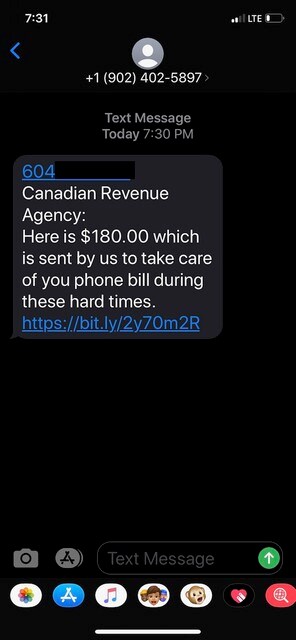By John Lawless
Scam artists seem to be taking advantage of the current public health emergency, preying on fear surrounding the COVID-19 pandemic.
Text scams appear to be increasing rapidly, and the RCMP have issued warnings so that people don't fall victim to these schemes. North Vancouver RCMP's Sgt. Peter DeVries received a scam text message of his own on Monday, and decided to share his experience a video.
"We've put out a number of these warnings recently, but always in uniform, always from the police station," he says. "We're hoping that seeing one of us in the same context where people may receive these bogus communications will create a bigger impression. Our ultimate goal is to make sure people don't fall for these scams."
The Canadian Anti-Fraud Centre is seeing a spike in fake emails, texts and social media posts that try to trick their victims into believing the Government of Canada is trying to send them COVID-19 relief money. The message instructs the recipient to click the attached link to claim their payment, then tricks them into sharing personal information which is then used to steal their identity and commit crimes under their name.
 Image courtesy RCMP
Image courtesy RCMPThese scammers will use a variety of tactics, including:
- Authority: Scam artists will impersonate agencies of authority such as the Canada Revenue Agency, who actually does not contact anyone via text message
- Spoofing: This is where scammers will change their display name, phone number or email. For emails you can hover over the sender's name, hit reply or look at the email's properties to reveal the sender's true email address
- Automation: Scammers will use automated messaging to reach a large amount of people at once, and depending on the information they have already collected, they can personalize the message
If you are the victim of a scam, first thing to do is to avoid clicking on the link. If you have lost money, valuables or have given your personal information, contact your local police detachment. If you have been contacted but have not lost anything or given out personal information, report the incident online to the Canadian Anti-Fraud Centre.
"Share this with your friends, your neighbours, and especially those in the community who may be particularly vulnerable, like new Canadians who may be unfamiliar with how our Government systems work, or people who may not be as technologically savvy as others," says DeVries. "Let's do everything we can to protect and care for one another."
Read more from Castanet



